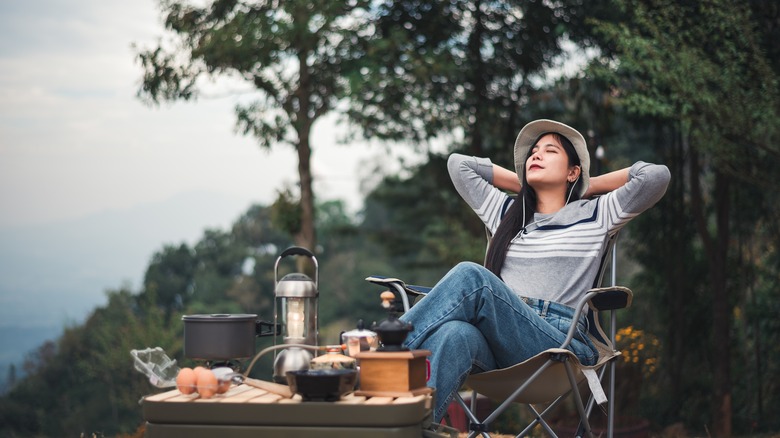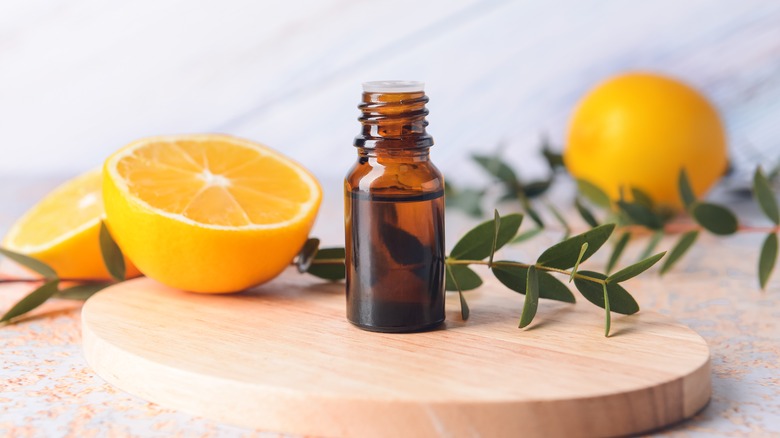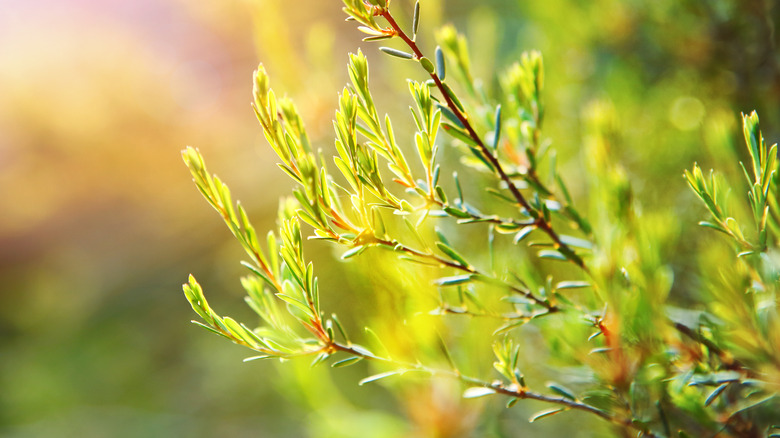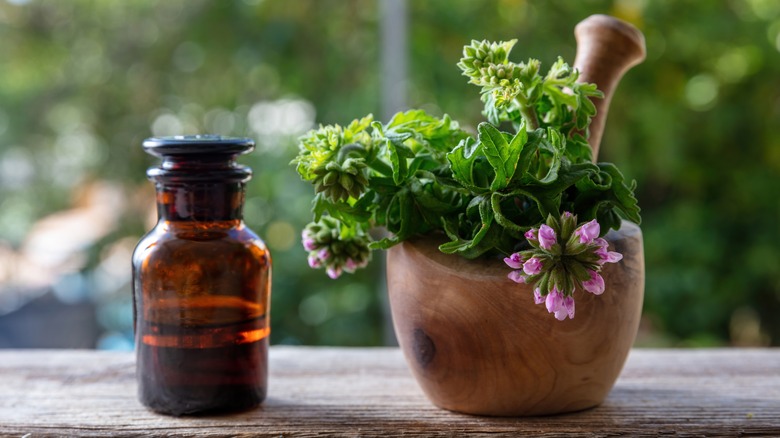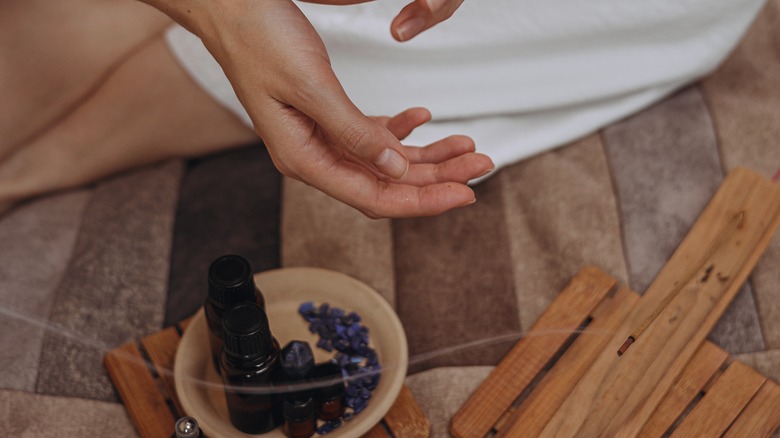The Essential Oils You Should Definitely Bring With You On A Camping Trip
You might call these oils an essential part of your packing list. The pure plant extracts are frequently used in aromatherapy. Different kinds have different uses, and several of them can help improve your next camping trip. They're designed to boost your mood, make your space feel comfortable, and have effects that range from stress-relieving to anti-inflammatory.
It's safe to say that these oils will do more than cover up the smell of stinky hiking boots, and it's also safe to say that they might not do everything some manufacturers promise. Studies are beginning to back up many claims made by aromatherapy experts, which we'll look at in this article. But the community still has a long way to go to establish its legitimacy, mainly because no U.S. regulatory agency has confirmed (or denied) the promised benefits of essential oils.
When it comes down to it, the essential oils we look at are all small and light enough to justify bringing them along on your next camping trip for the good vibes alone. Sure, some benefits could always be chalked up to placebo effects, but even if they are, who cares? If all lavender oil can do is help you smell lavender while you fall asleep in a tent, it's still a great thing to pack. So, keep an open mind and check out these essential oils that might be a game changer on your next camping trip — but don't rely on them in case of emergency.
Lemon Eucalyptus
Lemon eucalyptus is perhaps most famous for its inclusion in commercial DEET-free bug sprays. Consumer Reports tested various products made of at least 30% oil from the lemon eucalyptus tree and deemed the substance to be the second-most potent mosquito repellent behind DEET. However, the liquid used in commercial products like OFF! and Repel differs slightly from lemon eucalyptus essential oil (LEEO) — these plant-based bug sprays use oil of lemon eucalyptus (OLE). The difference is in how the species are obtained. LEEO is steam-distilled from the leaves, while OLE is extracted from the plant and refined to target specific repelling compounds.
LEEO doesn't have the same potency as OLE sprays, but it will provide a small level of bite protection. The real reason you should bring lemon eucalyptus with you on your camping trip is that it can repel mosquitos and provide medicinal value. For thousands of years, Indigenous Australians consumed this oil as an infusion to relieve headaches and applied it externally to help with wound healing and joint pain.
That tradition has continued in aromatherapy, where practitioners bathe, inhale, and massage with LEEO seeking anti-inflammatory, antioxidant, and immunoregulatory benefits. This oil won't replace your first aid kit, but a review in Pharmaceuticals highlights studies suggesting it can prevent and treat viral infections, and aromatherapy practitioners frequently use it for muscle pains. After a long day hiking, a diluted lemon eucalyptus rub might do wonders on tired feet.
Lavender
It's reasonable to argue that no smell has done more for aromatherapy than lavender, and the iconic essential oil brings plenty of benefits on a camping trip. Some people call lavender the "mother of oils" for its multi-functional healing qualities and soothing aroma. The fuss-free plant is great in almost any garden, and its liquid will benefit almost any cabinet. While there is a long list of things lavender oil might be able to help with, its strongest benefit is cultivating a sense of calmness.
According to an article in the Evidence-Based Complementary and Alternative Medicine, clinical trials found lavender essential oil superior to a placebo for treating anxiety and restlessness, Other studies have also found it effective at lowering blood pressure when incorporated into a massage. While the evidence is promising, not many researchers are willing to go too far in their claims about lavender. Most scientific reviews come to a similar conclusion but note that more evidence is necessary.
One thing people do agree on is that lavender oil helps you wind down at night. The New York Times called lavender as a sleep aid a "legitimate area of promise." There's enough science and testimony around to confidently say that lavender essential oil is an excellent choice for bedtime while camping, either by splashing a few drops on your pillow or around the edges of your sleeping bag. A cool night in the woods fueled by the sweet smell of this plant is a surefire recipe for a great night's sleep.
Tea Tree
You wouldn't be the first to pack tea tree oil in a backpack and march into the sunset. Australian soldiers were given this liquid in bottles as part of their kit during World War II and apparently used it as a disinfectant for treating wounds on the battlefield. In times of peace, tea tree extract is used in shampoos, facial creams, and topical ointments. Research has confirmed its benefits in many use cases, including treating acne, dandruff, athlete's foot, and lice. More importantly for a camping trip, a Clinical Microbiology Reviews article points to several studies that argue tea tree oil can work as an antimicrobial and anti-inflammatory. That means you can carry a small bottle of the liquid in your backpack as an emergency hand sanitizer or apply it topically on minor cuts and wounds.
Tea tree oil is also a natural anti-itching solution. While you should still probably look for antihistamines or hydrocortisone cream if a bee stings you in the middle of a hike, applying a few diluted drops of tea tree essential oil on mosquito bites or minor patches of inflammation might help relieve irritated skin and end your urge to itch. Just be sure to use this product with caution: Ingesting large amounts can be toxic to humans and pets. Make sure you dilute it before application and don't swallow it and you won't have much to worry about.
Citronella
Citronella oil might be the least surprising addition to this piece, but when you're packing for a hike or camping trip, you don't want to overlook the essentials. Citronella is a common ingredient in mosquito-repelling candles and other natural bug repellents. While the exact power of a citronella candle might be a bit overblown, several brands recommend applying diluted citronella essential oil directly to your skin as a natural bug-repellent.
Some tests have concluded that citronella oil alone won't protect your skin as much as a DEET spray would, but the product has proven itself to be at least slightly effective against mosquitoes, fleas, and ticks without leaving you smelling like a science experiment. The theory is that citronella, in its concentrated oil form, can mess with mosquitos' sense of smell. The bugs are usually attracted to the scent of carbon dioxide that's released from our bodies, and the hydrophobic liquid interferes with their olfactory receptors enough that they might leave your campsite alone. Ideally, use citronella in combination with a few other mosquito-preventing scents, like lemon eucalyptus.
Recent research also suggests that the essential oil might help protect against parasites. A 2022 Molecules study found that Java citronella oil was effective against two common parasites without being toxic to mammalian cells. The product certainly isn't potent enough to purify water or completely protect you against the risk of parasites in the woods, but these promising results make the liquid a nice thing to spritz on your next camping trip.
How to properly apply your essential oils
So you've packed your bags with eucalyptus and lavender oils, great. Now what? Most dermatologists agree that you shouldn't put undiluted essential oils directly on your skin. They're famous for their usage in aromatherapy, after all, not topical applications. However — especially in the case of oils that promise to help against bugs — the only way for them to work is if they make skin contact.
Let's look at the most straightforward ways to properly apply your essential oils in the woods. For skin contact, dilute your essential oils by mixing 1 to 2 drops per 1 teaspoon of carrier oil into a small spray bottle and apply it liberally. You can also look for a portable diffuser to apply oils like lavender aromatically. While not as common as electric diffusers, if you don't have power at your campsite, a battery-powered unit can freshen up your tent. Or just splash a few drops on its corners to vanquish any unwanted smells. Just remember: Using a diffuser to release essential oils or lighting candles made of these liquids might not stop mosquitos — and can even attract bears to your campsite.
